- Home
- Vicki Delany
Hark the Herald Angels Slay Page 2
Hark the Herald Angels Slay Read online
Page 2
“I don’t . . .”
“It’ll be fun to catch up, won’t it?” He gave me the grin that once upon a time would have been guaranteed to melt my feeble heart.
No longer.
The bells tinkled as the happy shopper left.
Max crossed the shop floor. “Those earrings you just sold,” he said to Jackie, “or ones like them, would be perfect for our article. I plan to do a sidebar on shopping. Maybe you could model them for us.”
I thought she was going to faint. “I’d be . . .”
“Good,” he said. “Our readers enjoy seeing what ordinary women are buying.” He walked out.
She watched him go with a look of pure adoration on her face. Jackie was vain and completely self-absorbed, but she had a kind heart and never a bad word to say about anyone. Poor Jackie didn’t even realize how deeply she’d been insulted. “You’re having dinner with that gorgeous man,” she said with a happy sigh. “You are so lucky, Merry. But what about Alan? What will he think? If you don’t want to go to dinner, I’ll take your place.”
“Jackie,” I said. “Stay away from him. From all of them. They are not nice people. Max Folger, most of all.”
“Pooh. You’re not my mother, Merry. When did you become such an old fogy? You always try to spoil everything for me.”
“You’re right that I’m not your mother, but I am your boss. And this is your place of employment. Button up your shirt and tuck it in.”
She pouted once again, but did as she was told, throwing me poisonous glances all the while.
“I’m going to take Mattie for a walk and grab some lunch on the way back.” I tried to make nice. I wasn’t an old fogy. I was merely trying to be a responsible businesswoman. My employees’ welfare was my concern, whether they wanted my help or not. “Want me to pick up a latte for you?”
“Sure. I’ve been thinking. Maybe I should wear my elf costume on Saturday after all.”
“Whatever,” I said. When I’d suggested Jackie and Crystal, my part-time helper, dress in costume on the weekend, Jackie had refused on the perfectly reasonable grounds that their elf getups were winter clothes. But the costume was cute, and after Jackie made a few unauthorized adjustments, playfully sexy. Easy to guess why she’d changed her mind.
The women who read Jennifer’s Lifestyle were not the type to want to see pictures of pretty, flirty young women posing in skimpy costumes. Max would lead Jackie on, have a good laugh about it, and throw out any pictures they did take.
I opened my office door and was hit full in the chest by a hundred and twenty pounds of happy dog.
“Down,” I wheezed, struggling to get my breath back.
Mattie grinned at me, his big pink tongue lolling out one side of his mouth. He was ten months old and was now well enough trained that I could bring him to work with me most days. He knew he didn’t belong in the shop (I shudder to think of him among the glass ornaments, delicate jewelry, and china dishes) and was content, if not exactly happy, to stay in the office. My office, not much more than a storage closet with a single visitor’s chair and a desk buried under stacks of paper, had been small before Mattie settled himself into the dog bed on the floor.
I reminded him that we didn’t leap upon our friends, no matter how pleased we were to see them, and took his leash down from the hook by the door. All winter and spring we’d worked hard at our training—training me as much as him. With an animal of his size good behavior was vitally important. He’d quickly become used to the activity in the shop and never barked when the door opened or people talked. I gave him an affectionate pat and he yipped in reply. We slipped out the back way into the alley and headed toward the park.
It looked as though I’d be having dinner tonight with Max Folger, ex-fiancé and cheating no-good son of a . . . after all. He always did have a way of talking me into doing things I didn’t really want to do. I could, of course, simply not show up at the restaurant. But then he’d hunt me down, probably arrive on my doorstep, and I’d feel obliged to invite him in. I needed to find out what he was up to. He might want to spin me a line like “love of my life” but I wasn’t going to fall for that again.
I’d enjoy a nice dinner and then tell him to go back to New York and the woman he’d dumped me for.
Chapter 2
The moment Mattie and I stepped out of the building into the alley, the heat hit us full on. Like all Saint Bernards, Mattie suffers dreadfully in the hot weather. Nothing he likes more than a romp in the snow, but no snow was threatening to come our way anytime soon, so at home and in the shop I kept the air-conditioning turned up as high as I dared. Nothing I could do about the great outdoors, though.
The humidity settled on my shoulders like a blanket. A hot, wet, sticky blanket. Mattie panted and his gait was noticeably slower than his usual all-out, enthusiastic gallop. As we walked, I pulled out my phone and called my best friend.
“Can I get back to you?” Vicky Casey said. “Lunch rush is starting.” I could hear the background buzz of her busy bakery.
“Just calling with a heads-up. A tall woman in white capris and a blue jacket with white piping, a white collar, and giant white buttons is possibly heading your way. She’s a style editor with Jennifer’s Lifestyle, and they might do a feature on your bakery.”
Vicky gasped. “You’re kidding? No, I know you, you’re not kidding. Hold on. I’m taking a peek. Yup, I think I see the one you mean. Tall is right. I think she’s even taller than me.”
“That’s the shoes,” I said. Vicky was five-eleven and a half. A good six inches taller than me. She was also rail thin, which I (not rail thin) thought highly unfair considering the woman baked delicious breads and mouthwatering pastries for a living.
“She’s studying the display case. She’s writing something in a little notebook. A guy’s with her and he has a camera. A heavy-duty camera. What should I do? Should I introduce myself?”
“No. Go out front and look authoritative, in charge. Keep your apron on. Whisper something to one of the staff. Give the visitors a polite nod. Maybe rearrange some pastries or something. Look important.”
“Don’t I always?” she said.
I refrained from saying, No, you don’t. With her midnight-black hair cut almost to her scalp, save for the single purple lock that fell over one eye, heavy dark makeup, tattoos, and piercings, Vicky rarely looked like the astute businesswoman she was. I put my phone away, and Mattie and I continued on our walk. Rudolph sits on the southern shores of Lake Ontario, tucked into a small bay. The sandy beach at the park was crowded with colorful umbrellas and folding chairs, and a handful of people were throwing balls in the shallows or swimming farther out. Past them, white sails dotted the sparkling blue water. The lake stretched to the horizon, calm and peaceful. I kept the walk short, not only because I needed to get back to the shop, but because the heat was bothering Mattie. He was panting heavily, leaving a trail of drool on the sidewalk behind him. A squirrel dashed across the grass and ran nimbly up a stately ancient oak. Mattie flicked his tail, took one step toward the creature, and then thought better of engaging in a chase.
“Enough for now, I think,” I said, leading him back to town. I tied the dog to a bike rack on a shady patch of sidewalk outside Cranberry Coffee Bar, next to a bowl of water they kindly kept refreshed for passing dogs, and went in to get my lunch, knowing Mattie would soon attract a circle of admirers. Despite his size, he was a gentle animal, as were all members of his breed, and he was particularly great with children. More than once I’ve had to ask parents to, please, not let their child try to ride the dog. He’s not a pony. He never seemed to mind, but I did think some people were inclined to take liberties.
We hadn’t had pets in my family when I was growing up, because my mom said fur stuck to everything. When I left home, first for college and then for a minuscule third-floor walk-up in Manhattan, a dog wasn’t possible. I w
asn’t even thinking of getting a pet when I returned to Rudolph last year, but Vicky Casey had other plans, and somehow Mattie, born on the wrong side of the doggy blanket to a purebred, reams of papers, kennel-show-star mother and a father with a wandering eye, came into my life. And, I have to say, into my heart.
I ordered a bran muffin and a small green salad with an iced coffee for me and a superlarge full-fat latte for Jackie. I carried my purchases outside and found, as well as the expected crowd of dog admirers, my parents. I was pleased to see them; I’d been wondering how I was going to manage untying the dog while carrying two cups and a paper bag. “Hold these,” I said, thrusting the cups at Mom. She looked wonderful, as she always did, in a white dress cut exactly at her knees, with short sleeves, a scooped neck, a thin pink belt, and matching pink sandals. My dad looked . . .
“Are you Santa Claus?” a small girl was brave enough to ask.
Dad tapped the side of his nose. “I might be. I might not be. Although, I am here checking to see if children have been naughty or nice. Have you?” His round belly shook and his blue eyes twinkled above his red nose and curly white beard. He wore red and green striped Bermuda shorts with a green checked shirt and white socks thrust into heavy brown sandals.
“Yes, Santa,” she said, giving him a huge grin that showed two missing front teeth.
My mom took a step backward in case some overly bold child would dare to ask if she was Santa’s helper. My parents are a strange pair. Totally mismatched in every way, but completely devoted to each other.
“I hear,” Dad said, “Santa is coming to town on Saturday for his summer vacation. He’ll be arriving around one, at the boat dock.”
“We’ll be there, Santa,” the child’s mother said, smothering a giggle.
“Is that a reindeer disguised as a dog, Mom?” I heard the girl say as her mother led her away.
I untied Mattie. “Don’t even think it,” I said to Dad.
“Think what, honeybunch?” he said innocently.
“Mattie is not going to put antlers on his head and a red ball on his nose and pretend to be Rudolph.”
“Perish the thought,” Dad said.
“He has his dignity, you know.” I gave the dog a hearty pat. One advantage of owning a giant dog—I didn’t have to bend over to reach him.
My parents fell into step beside me and we walked down the block to the alley.
“We were coming to see you,” Dad said, “and saw your dog. I hear a magazine’s in town wanting to write about the weekend.”
“Not just a magazine,” Mom said. “Jennifer’s Lifestyle. Your old colleagues.”
“I know. They came into the shop earlier. Max is with them.”
“I hadn’t heard that,” Mom said. “Are you all right, dear?”
“Of course I am. Why wouldn’t I be?” I didn’t miss the look that passed between my parents. “I have no problem seeing Max, none at all. The publicity will be good for the town.”
“Yes, it will,” Dad said. “Be sure and tell Max about the boat parade.”
“If they want information,” Mom said, “they can get it from the town publicity office, like anyone else.”
“I’m okay with it, Mom. Listening to them sniping away at each other made me realize I made the right decision in leaving the magazine and coming back to Rudolph.” Mom touched my shoulder and I gave her a smile. “Here, the only person I have to snipe at is Jackie, and she’s no challenge.”
Dad laughed. “With them in town, all the more reason to hope the boat thing goes off okay.”
“I still think it’s a wonderful idea,” I said. “Are you having doubts?”
“No more than the usual misgivings before implementing any new idea.” One of the major Rudolph traditions is the semiannual Santa Claus parade. As well as the main event the first Saturday in December, we also have one on the Saturday before July 25th. This year the town council decided to shake things up a bit and have Santa arrive by boat at the rear of a gaily decorated flotilla. Traditionalists grumbled, as traditionalists always do, but most people liked the idea. It was a lot less work for one thing, sticking a bit of tinsel and some baubles onto a boat, than doing up a flatbed float to be pulled by a truck or tractor. Some people worried that we wouldn’t be able to find sufficient boats for everyone who wanted to participate, but with our perfect small-boat harbor, plenty of Rudolphites own some sort of watercraft, and that turned out not to be a problem.
We reached the back of my shop. I dug in my pocket and pulled out the key.
“I haven’t seen Alan around much lately. Will he be helping you on Saturday, Noel?” Mom spoke to my dad but her eyes were on me. I lowered my head and fiddled with putting the key into the lock.
“Of course,” Dad said. “Why wouldn’t he?”
Alan Anderson was a local artisan, specializing in woodwork. He created many of the beautiful handcrafted things I sell in the shop. He also served as Santa’s head toymaker at official functions.
“Merry?” Mom said.
“Yes, Mom?”
“Alan hasn’t been around much since he got back from Florida.”
“He’s been busy. I’ve been busy. We’ve all been busy.” I shoved the door open, and Mattie dashed inside. I dropped the leash and took the cups from Mom. “Thanks.”
“If you need to talk, dear.”
“I don’t. Catch you later.” I didn’t quite slam the door in my parents’ faces.
Alan Anderson. I didn’t know what was going on between Alan and me, and my parents were starting to give me questioning looks (Dad) and dropping hints (Mom). Alan and I had dated in high school and broke up on graduation when we went our separate ways. Now that I was back in town, we’d discovered that the old spark hadn’t died, and over Christmas we realized we wanted to pick up where we’d left off. After that, things had gone nowhere fast. I didn’t know who to blame. If anyone.
Alan’s parents had moved to Florida for their retirement, and in February his dad broke a leg while golfing. That seems like a joke, but Mr. Anderson stepped into a hole in search of his ball buried in the weeds and fell hard. Alan had gone to Tampa to help out. His dad was also a woodworker, which is how Alan had learned his craft, and he’d set up a fully equipped woodworking shop at the new house. Spring is quiet in Rudolph, so Alan stayed in Florida, where he could keep working while he helped his mom look after his dad. He’d come home in May, but we’d scarcely seen each other since. Somehow our schedules hadn’t seemed to mesh. Maybe that was my fault. I’d had a hard time when Max left me for another woman with no warning. One day I’d been expecting a ring in a little box with a big ribbon and obsessing over wedding magazines, and the next I was packing my bags and heading out of town. That had been less than a year ago, and my heart still shied away from the possibility of hurt.
• • •
“I have never stopped loving you, Merry Wilkinson.”
“Please. No.”
“It’s why I’m here. I want you back. I want you back in New York and back in my life. Where you belong.”
“I have a life here,” I said.
“A small town in Upstate New York, owning a one-employee store? That’s not a life for you. I saw your parents earlier. Your mom looks great. She says she misses her old life sometimes but she’s happy in retirement. That’s your mother, Merry. It can be you in forty years. Not now.”
I twisted the stem of the wineglass in my fingers and studied the deep red liquid. I looked up, into the face of the man sitting across from me, and I realized I wasn’t tempted in the least.
I’d moved on. I’d seen Max Folger for the shallow, money-grubbing, ruthlessly ambitious man he was, and I wanted no part of him. “Are we going to order? I’m looking forward to a nice meal, but this conversation is over.”
“Have you found someone else?”
An image of
Alan flashed through my mind. I shook my head. “None of your business if I have or have not.”
“Okay. I’ll drop it. For now, but don’t expect me to give up, Merry. I’ll never give up on you.”
“What about Erica? What about your engagement to her? I thought you were getting married next month. Isn’t it going to be the social event of the season?”
He grimaced and ran his fingers through his hair. “It’s turned into a nightmare. I was desperate to get the heck out of town, so when I remembered you talking about this quirky place you came from, I grabbed at the idea. I was lucky to be able to drag a couple of the staff with me. Everyone else is all tied up in wedding preparations. It’s complicated.”
“I bet it is.” Trust Max. He hadn’t broken off with Erica yet, not until he was sure I wanted to come back to him.
Erica was the granddaughter of Jennifer Johnstone, founder of the Jennifer’s Lifestyle empire, which included, as well as the magazine, a TV show, a restaurant chain, and stores selling deck furniture, patio accessories, and supplies for alfresco cooking. Jennifer was the doyenne of anything and everything to do with casual, outdoor, modern American entertaining. Max and I had worked together at the magazine. I’d loved every minute of it. The exciting job, being part of the fashionable New York world, living in the heart of Manhattan. I’d loved Max, too, and my life had been perfect. Then Jennifer retired and handed control of the magazine to her granddaughter. And we were all reminded of the old saying: rags to riches to rags in three generations. Erica had not an ounce of business sense, along with no desire to accumulate any, nor did she feel the need to accept any advice. She clearly hadn’t inherited her grandmother’s excellent taste and eye for the next big thing.
She did, however, have an eye for a handsome man, and as her grandmother was pushing her to produce great-grandchildren, Erica settled that eye on Max Folger.
I don’t know if Max had ever loved her, and I didn’t really care. She had enough money to convince an ambitious man that he was in love. And so Max was promoted to executive editorial director, given a big corner office with a fabulous view of the East River, and I was told I was surplus to requirements, in the romance department anyway. I wasn’t actually fired, but I could hardly continue working there any longer. I quit and came home to Rudolph with my tail between my legs.

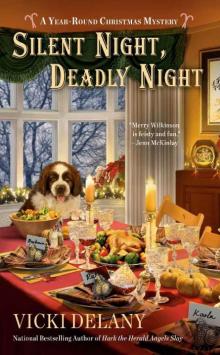 Silent Night, Deadly Night
Silent Night, Deadly Night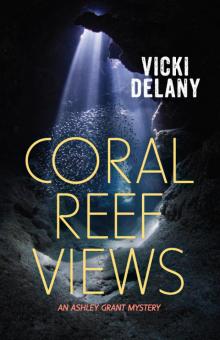 Coral Reef Views
Coral Reef Views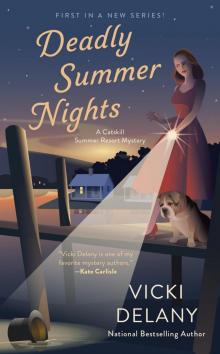 Deadly Summer Nights
Deadly Summer Nights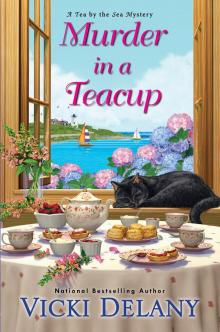 Murder in a Teacup
Murder in a Teacup Whiteout
Whiteout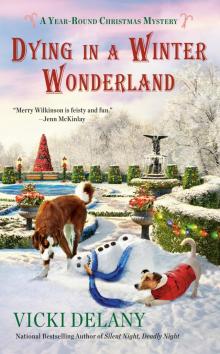 Dying in a Winter Wonderland
Dying in a Winter Wonderland Tea & Treachery
Tea & Treachery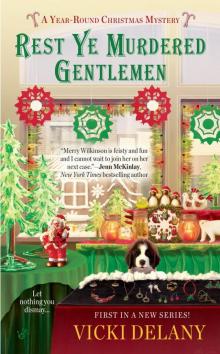 Rest Ye Murdered Gentlemen
Rest Ye Murdered Gentlemen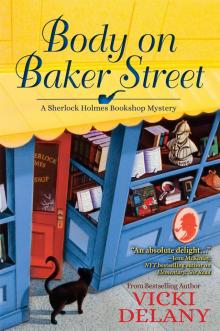 Body on Baker Street: A Sherlock Holmes Bookshop Mystery
Body on Baker Street: A Sherlock Holmes Bookshop Mystery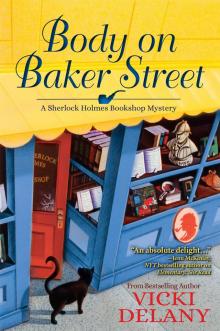 Body on Baker Street
Body on Baker Street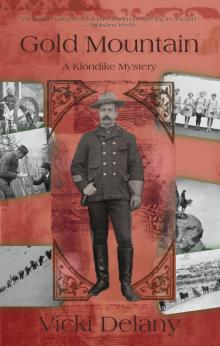 Gold Mountain
Gold Mountain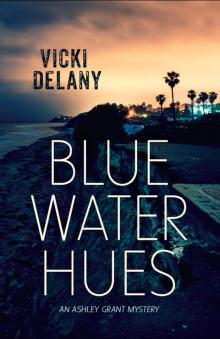 Blue Water Hues
Blue Water Hues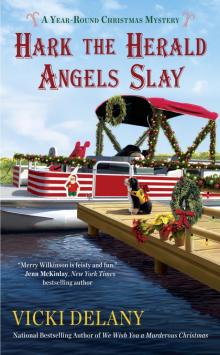 Hark the Herald Angels Slay
Hark the Herald Angels Slay Murder at Lost Dog Lake
Murder at Lost Dog Lake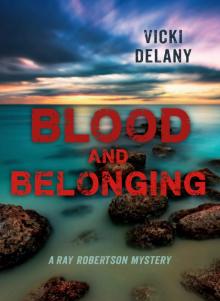 Blood and Belonging
Blood and Belonging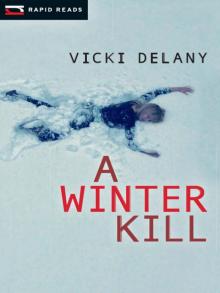 A Winter Kill
A Winter Kill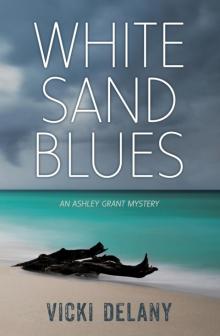 White Sand Blues
White Sand Blues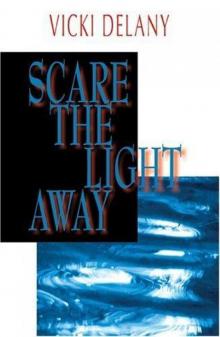 Scare the Light Away
Scare the Light Away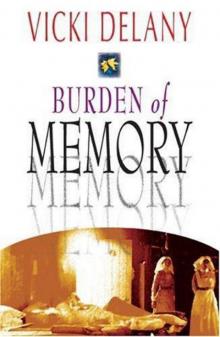 Burden of Memory
Burden of Memory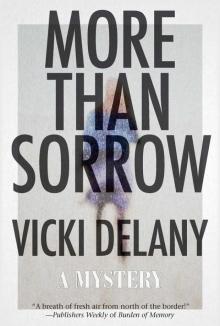 More Than Sorrow
More Than Sorrow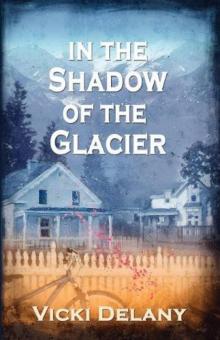 In the Shadow of the Glacier
In the Shadow of the Glacier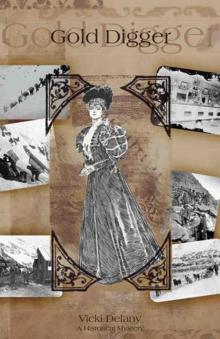 Gold Digger: A Klondike Mystery
Gold Digger: A Klondike Mystery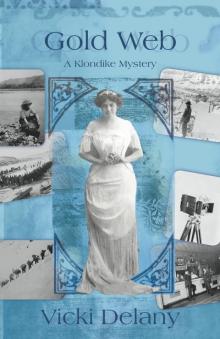 Gold Web
Gold Web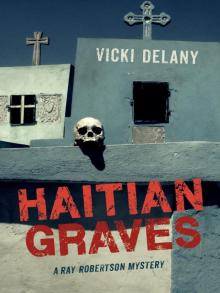 Haitian Graves
Haitian Graves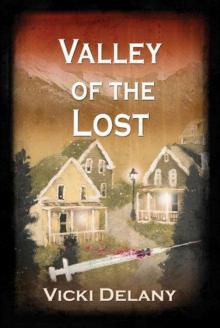 Valley of the Lost
Valley of the Lost We Wish You a Murderous Christmas
We Wish You a Murderous Christmas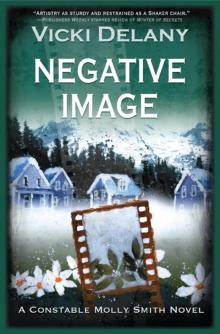 Negative Image
Negative Image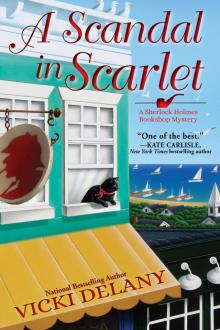 A Scandal in Scarlet
A Scandal in Scarlet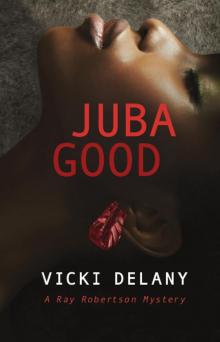 Juba Good
Juba Good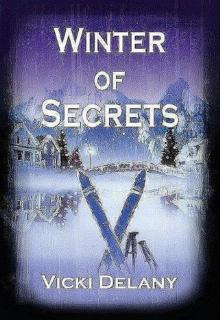 Winter of Secrets
Winter of Secrets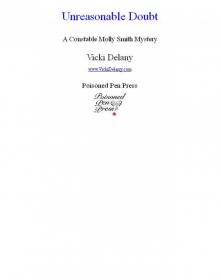 Unreasonable Doubt
Unreasonable Doubt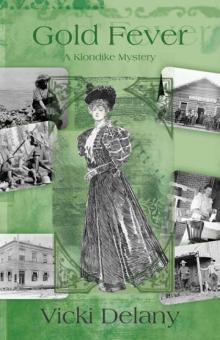 Gold Fever
Gold Fever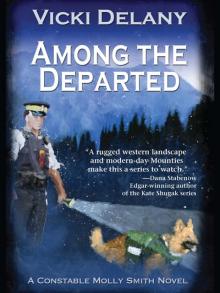 Among the Departed
Among the Departed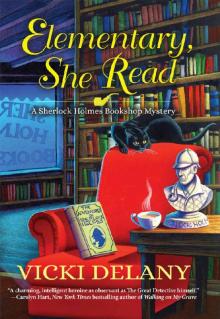 Elementary, She Read: A Sherlock Holmes Bookshop Mystery
Elementary, She Read: A Sherlock Holmes Bookshop Mystery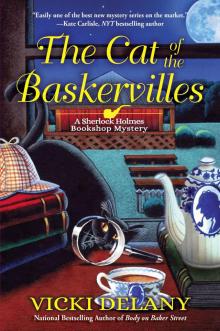 The Cat of the Baskervilles
The Cat of the Baskervilles